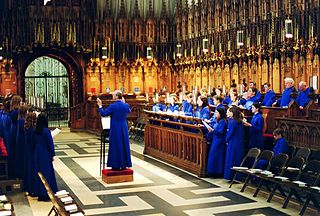Related Research Articles

Ephrem the Syrian, also known as Saint Ephrem, Saint Ephraim, Ephrem of Edessa or Aprem of Nisibis, was a prominent Christian theologian and writer, who is revered as one of the most notable hymnographers of Eastern Christianity. He was born in Nisibis, served as a deacon and later lived in Edessa.

A choir is a musical ensemble of singers. Choral music, in turn, is the music written specifically for such an ensemble to perform. Choirs may perform music from the classical music repertoire, which spans from the medieval era to the present, or popular music repertoire. Most choirs are led by a conductor, who leads the performances with arm, hand, and facial gestures.

John Milford Rutter is an English composer, conductor, editor, arranger, and record producer, mainly of choral music.
John Maynard La Montaine, also later LaMontaine, was an American pianist and composer, born in Oak Park, Illinois, who won the 1959 Pulitzer Prize for Music for his Piano Concerto No. 1 "In Time of War" (1958), which was premiered by Jorge Bolet.
Alan Ridout was a British composer and teacher.
William James Mathias CBE was a Welsh composer noted for choral works.

Rejoice in the Lamb is a cantata for four soloists, SATB choir and organ composed by Benjamin Britten in 1943 and uses text from the poem Jubilate Agno by Christopher Smart (1722–1771). The poem, written while Smart was in an asylum, depicts idiosyncratic praise and worship of God by different things including animals, letters of the alphabet and musical instruments. Britten was introduced to the poem by W. H. Auden whilst visiting the United States, selecting 48 lines of the poem to set to music with the assistance of Edward Sackville-West. The cantata was commissioned by the Reverend Walter Hussey for the celebration of the 50th anniversary of the consecration of St Matthew's Church, Northampton. Critics praised the work for its uniqueness and creative handling of the text. Rejoice in the Lamb has been arranged for chorus, solos and orchestral accompaniment, and for SSAA choir and organ.

Bradley Ellingboe is an American composer, conductor, and bass-baritone singer.

Hodie is a cantata by Ralph Vaughan Williams. Composed between 1953 and 1954, it is the composer's last major choral-orchestral composition, and was premiered under his baton at Worcester Cathedral, as part of the Three Choirs Festival, on 8 September 1954. The piece is dedicated to Herbert Howells. The cantata, in 16 movements, is scored for chorus, boys' choir, organ and orchestra, and features tenor, baritone, and soprano soloists.

Katherine Kennicott Davis was an American composer, pianist, arranger, and teacher, whose most well-known composition is the Christmas song "Carol of the Drum," later known as "The Little Drummer Boy".
"Song for Athene" is a musical composition by British composer John Tavener with lyrics by Mother Thekla, an Orthodox nun, which is intended to be sung a cappella by a four-part choir. It is Tavener's best known work, having been performed by the Westminster Abbey Choir conducted by Martin Neary at the funeral service of Diana, Princess of Wales, on 6 September 1997 as her cortège departed from Westminster Abbey.

The Crucifixion: A Meditation on the Sacred Passion of the Holy Redeemer is an oratorio for a SATB choir and organ composed by John Stainer in 1887, with text by W J Sparrow Simpson. The piece relates the Biblical narrative of the Passion and Crucifixion of Jesus. It is particularly noted for the Christian hymn, All for Jesus, All for Jesus.
In convertendo Dominus, Op. 32, is the musical setting of In convertendo Dominus, written by Jules Van Nuffel in 1926 for a mixed choir and organ.
The Holy Boy is a short composition by the English composer John Ireland. Alongside his setting of the hymn "My Song Is Love Unknown", it is probably his best-known work. Originally for solo piano, Ireland arranged it for various other forces over nearly 30 years. A performance takes about 3 minutes.
Steven Sametz is active as both conductor and composer. He has been hailed as "one of the most respected choral composers in America." Since 1979, he has been on the faculty of Lehigh University in Bethlehem, Pennsylvania, where he holds the Ronald J. Ulrich Chair in Music and is Director of Choral Activities and is founding director of the Lehigh University Choral Union. Since 1998, he has served as Artistic Director of the professional a cappella ensemble, The Princeton Singers. He is also the founding director of the Lehigh University Summer Choral Composers’ Forum. In 2012, he was named Chair of the American Choral Directors Association Composition Advisory Committee.

Fallt mit Danken, fallt mit Loben, BWV 248IV, is a Christmas cantata by Johann Sebastian Bach, composed in 1734 as Part IV of his six-part Christmas Oratorio. Each part of the oratorio is a cantata, written for performance on one of the feast days of the Christmas period. Fallt mit Danken, fallt mit Loben is meant for the New Year's Day feast of the circumcision and naming of Jesus. Based on a libretto by an unknown author, it tells the naming of Jesus from the Nativity of Jesus, according to the Gospel of Luke.
Mother and Child is a choral composition by John Tavener written in 2002 on a commission from the Tenebrae vocal ensemble. The lyrics were written by Brian Keeble. The music is set for a choir in up to nine vocal parts, organ and temple gong. The duration is about 10 minutes. The composition was first recorded by Tenebrae in 2003 on an album of the same name, conducted by Nigel Short. The work was published by Chester Music in 2004.
References
- ↑ Robert Reilly (21 April 2016). Surprised by Beauty: A Listener's Guide to the Recovery of Modern Music. Ignatius Press. p. 362. ISBN 978-1-68149-704-4.
- ↑ https://books.google.com/books?id=GW5DCwAAQBAJ&dq=thunder%20entered%20her%20ephraim&pg=PT153
- ↑ Liner notes to EMI Classics 50999 2 37691 2 0
- ↑ Liner notes by Michael Stewart from CD Virgin Classics 545035-2.
- ↑ Keith Potter; Kyle Gann (23 March 2016). The Ashgate Research Companion to Minimalist and Postminimalist Music. Routledge. p. 316. ISBN 978-1-317-04255-6.